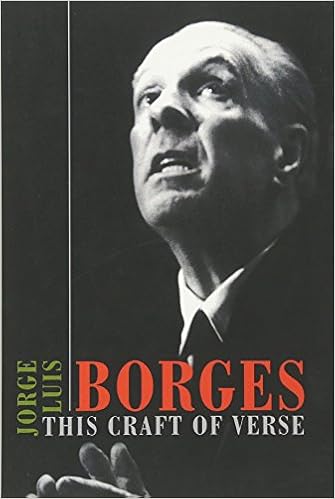
Every Borges lecture is always a treat (see also the superb lecture collection Professor Borges: A Course on English Literature), so thankfully this recent transcription of a series of rediscovered lectures Borges gave at Harvard in the 60s has been made available to us. Not only was he one of the greatest writers of all time, but such a generous reader and riveting speaker that it's impossible to not want to immediately jump on everything he references. I do think his modesty is often comical, as in his occasional phrasings of "oh, I may have forgotten this minor detail", when the reader knows full well that he delivered these multilingual, polyphonic, omnierudite lectures based solely on memory without any notes at all, but his humble and self-effacing demeanor is so sincere, and his passion for literature so genuine, that it would be crazy to not give him the same charity as he gives his audience. Even the titles of the half-dozen lectures here are intriguing - "The Riddle of Poetry", "The Metaphor", "The Telling of the Tale", "Word: Music and Translation", "Thought and Poetry", and "A Poet's Creed" - but to actually read them (or hear them; the whole thing is on YouTube) is to be transported into the presence of someone who is overflowing with pleasure at the inexhaustible joys that come from the simple act of reading really fine literature. Here are some choice quotes that I enjoyed in the course of reading it, but the thing has to be experienced in its completeness because there's insights on every page:
Sometimes, looking at the many books I have at home, I feel I shall die before I come to the end of them, yet I cannot resist the temptation of buying new books. Whenever I walk into a bookstore and find a book on one of my hobbies - for example, Old English or Old Norse poetry - I say to myself, "What a pity I can't buy that book, for I already have a copy at home."
If we think of the novel and the epic, we are tempted into thinking that the chief difference lies in the difference between verse and prose, in the difference between singing something and stating something. But I think there is a greater difference. The difference lies in the fact that the important thing about the epic is the hero - a man who is a pattern for all men. While, as Mencken pointed out, the essence of most novels lies in the breaking down of a man, in the degeneration of character.
Walter Pater wrote that all art aspires to the condition of music. The obvious reason (I speak as a layman of course) would be that, in music, form and substance cannot be torn asunder. Melody, or any piece of music, is a pattern of sounds and pauses unwinding itself in time, a pattern that I do not suppose can be torn. The melody is merely the pattern, and the emotions it sprang from, and the emotions it awakens. The Austrian critic Hanslick wrote that music is a language that we can use, that we can understand, but that we are unable to translate.
Remember that Alfred North Whitehead wrote that, among the many fallacies, there is the fallacy of the perfect dictionary - the fallacy of thinking that for every perception of the senses, for every statement, for every abstract idea, one can find an exact counterpart, an exact symbol, in the dictionary.
When I speak of night, I am inevitably - and happily for us, I think - reminded of the last sentence of the first book in Finnegans Wake, wherein Joyce speaks of "the rivering waters of, hitherandthithering waters of. Night!" This is an extreme example of an elaborate style. We feel that such a line could have been written only after centuries of literature. We feel that the line is an invention, a poem - a very complex web, as Stevenson would have had it. And yet I suspect there was a moment when the word "night" was quite as impressive, was quite as strange, was quite as awe-striking as this beautiful winding sentence: "rivering waters of, hitherandthithering waters of. Night!"
I think of myself as being essentially a reader. As you are aware, I have ventured into writing; but I think that what I have read is far more important than what I have written. For one reads what one likes - yet one writes not what would like to write, but what one is able to write.
I had read in Lugones that the metaphor was the essential element of literature, and I accepted that dictum. Lugones wrote that all words were originally metaphors. This is true, but it is also true that in order to understand most words, you have to forget about the fact of their being metaphors. For example, if I say, "Style should be plain", then I don't think that we should remember that "style" (stylus) meant "pen", and that "plain means "flat", because in that case we would never understand it.

No comments:
Post a Comment
Note: Only a member of this blog may post a comment.